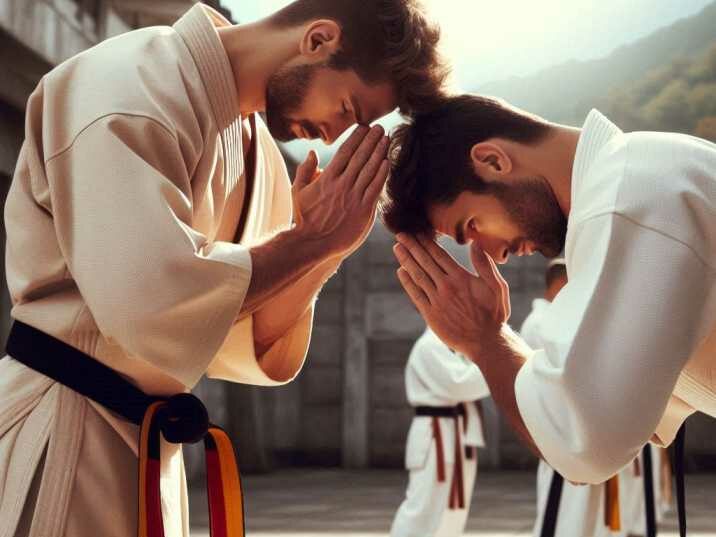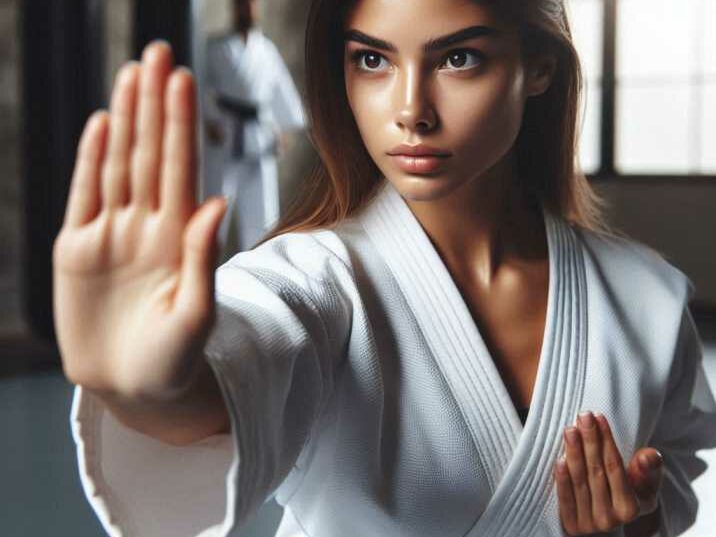Table of Content
Table of Contents
Introduction
Importance of Discipline in martial arts
- Consistency and Focus
- Physical Fitness
- Mental Strength
- Self-Defense
- Teamwork and Camaraderie
- Overcoming Challenges
- Life Beyond Martial Arts
- Fostering Personal Growth and Self-Mastery
Conclusion
FAQs
Introduction
Why is discipline important in martial arts? This question often arises for those new to the practice. Martial arts is more than just self-defense techniques; it’s a comprehensive system that builds character, resilience, and self-control. Discipline is the backbone of these benefits, playing a crucial role in shaping both the body and mind. In this blog post, we’ll explore the importance of discipline in martial arts, detailing how it enhances various aspects of life, from physical fitness to mental strength. Get ready to understand how discipline can transform your martial arts journey and your everyday life.

Importance of Discipline in martial arts
Building Consistency
Discipline is the key to consistency in martial arts practice. Regular training sessions are essential for mastering techniques and building muscle memory. Without discipline, it’s easy to skip classes or miss practice, which can hinder progress. Consistency allows you to gradually improve and achieve your martial arts goals.
Regular practice also helps in maintaining physical fitness. Martial arts require strength, agility, and endurance, all of which are developed through consistent training. Discipline in martial arts ensures that you stick to your practice routine, allowing you to build and maintain these physical attributes.
Furthermore, consistency fosters a sense of commitment. When you regularly show up for training, you demonstrate a commitment to your art and yourself. This commitment is a form of discipline in martial arts that spills over into other areas of life, helping you to be more reliable and dedicated in everything you do.
Enhancing Focus
One of the remarkable benefits of martial arts is the enhancement of focus. Discipline in martial artsplays a pivotal role in this aspect. When you practice martial arts, you need to pay close attention to your movements, your opponent, and your surroundings. This level of focus can only be achieved through disciplined practice.
Improved focus is not limited to the training hall. The ability to concentrate on tasks without getting easily distracted is a valuable skill in everyday life. Whether at work, school, or home, disciplined martial arts practice helps you develop the mental fortitude to stay focused on your goals.
Additionally, enhancing focus through discipline helps in better decision-making. In martial arts, every move must be deliberate and well-thought-out. This habit of making calculated decisions becomes second nature, benefiting you in making thoughtful choices in various aspects of life.

Physical Benefits
Discipline in martial arts is essential for reaping the physical benefits of martial arts. Regular training helps improve cardiovascular health, build muscle strength, and enhance flexibility. These physical benefits are crucial for overall health and well-being.
Martial arts also help in weight management. The disciplined practice involves rigorous physical activity, which burns calories and reduces body fat. Maintaining a healthy weight is essential for preventing various health issues such as heart disease, diabetes, and hypertension.
Another significant physical benefit is improved coordination and balance. Martial arts techniques require precise movements, which enhance motor skills. Disciplined practice ensures that you continually improve these skills, leading to better coordination and balance in daily activities.
Mental Strength
Discipline in martial arts builds mental strength. The rigorous training and the challenges faced during practice help develop resilience and perseverance. Mental strength is crucial for overcoming obstacles both in martial arts and in life.
Practicing martial arts requires a high level of mental toughness. You need to push through physical fatigue, manage pain, and stay focused despite distractions. Discipline helps you develop the mental fortitude to handle these challenges effectively.
Mental strength also involves emotional regulation. Through disciplined practice, you learn to control your emotions, stay calm under pressure, and respond thoughtfully rather than react impulsively. These skills are invaluable in managing stress and maintaining mental health.
Emotional Control
Martial arts teach emotional control through discipline. The practice involves intense physical and mental exertion, which can trigger various emotions such as frustration, anger, and anxiety. Discipline helps you manage these emotions constructively.
Learning to control emotions is essential for effective martial arts practice. When you can stay calm and focused, you perform better and make better decisions. Discipline teaches you to channel your emotions into positive energy, enhancing your performance.
Furthermore, emotional control extends beyond the dojo. The ability to manage emotions in high-stress situations is a valuable life skill. Whether in personal relationships or professional settings, emotional control helps you communicate effectively and maintain healthy interactions.
Respect and Humility
Respect and humility are core values in martial arts, cultivated through disciplined practice. Martial arts training emphasizes respect for instructors, fellow practitioners, and the art itself. Discipline ensures that you uphold these values consistently.
Humility is another important aspect of martial arts. No matter how skilled you become, there is always room for improvement. Discipline in martial arts helps you stay humble and open to learning, which is essential for continuous growth.
Practicing respect and humility in martial arts translates to respectful behavior in everyday life. These values foster positive relationships and create a supportive and collaborative environment in both personal and professional settings.
Goal Setting
Discipline in martial arts is crucial for effective goal setting. Setting clear, achievable goals helps you stay motivated and focused on your training. Discipline ensures that you commit to these goals and work diligently towards achieving them.
Goal setting in martial arts involves breaking down long-term objectives into smaller, manageable tasks. This approach makes it easier to track progress and stay motivated. Discipline helps you stay on track and adjust your goals as needed.
Achieving goals in martial arts boosts confidence and provides a sense of accomplishment. This positive reinforcement encourages you to set and achieve goals in other areas of life, fostering a mindset of continuous improvement and success.
Self-Defense
Discipline is essential for effective self-defense in martial arts. Self-defense techniques require precision, timing, and control, all of which are developed through disciplined practice. Without discipline, it’s challenging to master these techniques and apply them effectively in real-life situations.
Practicing self-defense with discipline in martial arts ensures that you react appropriately under pressure. In a self-defense scenario, staying calm and focused is crucial. Discipline in martial arts helps you maintain composure and execute techniques accurately.
Furthermore, disciplined self-defense training builds confidence. Knowing that you can protect yourself and others provides a sense of security and empowerment. This confidence extends beyond self-defense, positively impacting various aspects of life.
Teamwork and Camaraderie
Martial arts often involve group training, fostering a sense of teamwork and camaraderie. Discipline in martial artsis crucial for maintaining a positive and supportive training environment. Respecting training partners, following class protocols, and working together are all aspects of disciplined practice.
Teamwork in martial arts enhances learning and performance. Training with others provides opportunities for feedback, motivation, and mutual support. Discipline ensures that you contribute positively to the team and benefit from the collective effort.
Building camaraderie in martial arts creates a sense of belonging and community. The disciplined environment fosters strong bonds among practitioners, providing a support network that extends beyond the dojo.
Overcoming Challenges
Discipline in martial arts is the key to overcoming challenges. The practice involves various physical and mental hurdles, from mastering complex techniques to pushing through physical fatigue. Discipline helps you stay committed and persevere through these challenges.
Facing and overcoming challenges in martial arts builds resilience. Each obstacle you overcome strengthens your ability to handle difficulties, fostering a growth mindset. Discipline ensures that you approach challenges with determination and a positive attitude.
Additionally, overcoming challenges in martial arts boosts self-esteem. Each success, no matter how small, provides a sense of accomplishment and confidence. This increased self-esteem motivates you to tackle challenges in other areas of life with the same disciplined approach.
Life Beyond Martial Arts
The discipline learned in martial arts extends beyond the dojo, positively impacting various aspects of life. Whether in academics, career, or personal relationships, the principles of discipline, focus, and resilience apply universally.
In academics, discipline helps you stay organized, manage time effectively, and stay committed to your studies. The focus and concentration developed through martial arts practice enhance learning and academic performance.
In your career, discipline fosters professionalism, reliability, and a strong work ethic. Employers value employees who are disciplined, focused, and resilient, making you a valuable asset to any organization.
In personal relationships, the emotional control, respect, and humility cultivated through martial arts contribute to healthy and positive interactions. Discipline helps you communicate effectively, manage conflicts, and build strong, supportive relationships.
Fostering Personal Growth and Self-Mastery
Discipline is the catalyst for personal growth and self-mastery in martial arts. By embracing discipline, practitioners cultivate a strong work ethic, perseverance, and a growth mindset. They set goals, break them down into manageable steps, and consistently work towards achieving them. Discipline instills patience and teaches martial artists the value of continuous improvement
Conclusion
In conclusion, discipline is the foundation of martial arts, providing numerous benefits that extend beyond the dojo. From building consistency and focus to enhancing physical fitness and mental strength, discipline is crucial for mastering martial arts and achieving personal growth. By cultivating discipline, you can overcome challenges, achieve your goals, and positively impact various aspects of your life. Whether you’re a seasoned practitioner or a beginner, the principles of discipline in martial arts can transform your practice and your life.
If you’re ready to experience the benefits of discipline in martial arts, consider joining a class or training program near you. For personalized guidance and support, book a call with one of our experienced martial arts instructors today. Start your journey towards mastering martial arts and unlocking your full potential through disciplined practice.
Frequently Asked Questions (FAQs)
1. What age is appropriate to start martial arts training?
Martial arts training can begin as early as age four for some disciplines, depending on the child’s maturity and ability to follow instructions. Many schools offer specialized classes for different age groups to ensure appropriate training methods and safety.
2. Do I need any previous experience to start martial arts?
No previous experience is necessary to begin martial arts training. Classes are typically designed to accommodate all skill levels, from beginners to advanced practitioners. Instructors provide guidance tailored to individual abilities and progress.
3. What type of martial arts should I choose?
The choice of martial art depends on your personal interests and goals. For self-defense, arts like Brazilian Jiu-Jitsu, Krav Maga, or Muay Thai may be preferred. For a focus on discipline and traditional techniques, consider Karate, Taekwondo, or Kung Fu.
4. How often should I train to see improvement?
Consistency is key in martial arts training. Beginners are encouraged to train at least 2-3 times per week to build foundational skills and improve gradually. More advanced students may train more frequently to enhance proficiency and conditioning.
5. What should I wear to my first martial arts class?
For your first martial arts class, wear comfortable, loose-fitting athletic clothing that allows for a full range of motion. Many schools provide uniforms, or you may receive guidance on appropriate attire for your specific discipline once you enroll.


